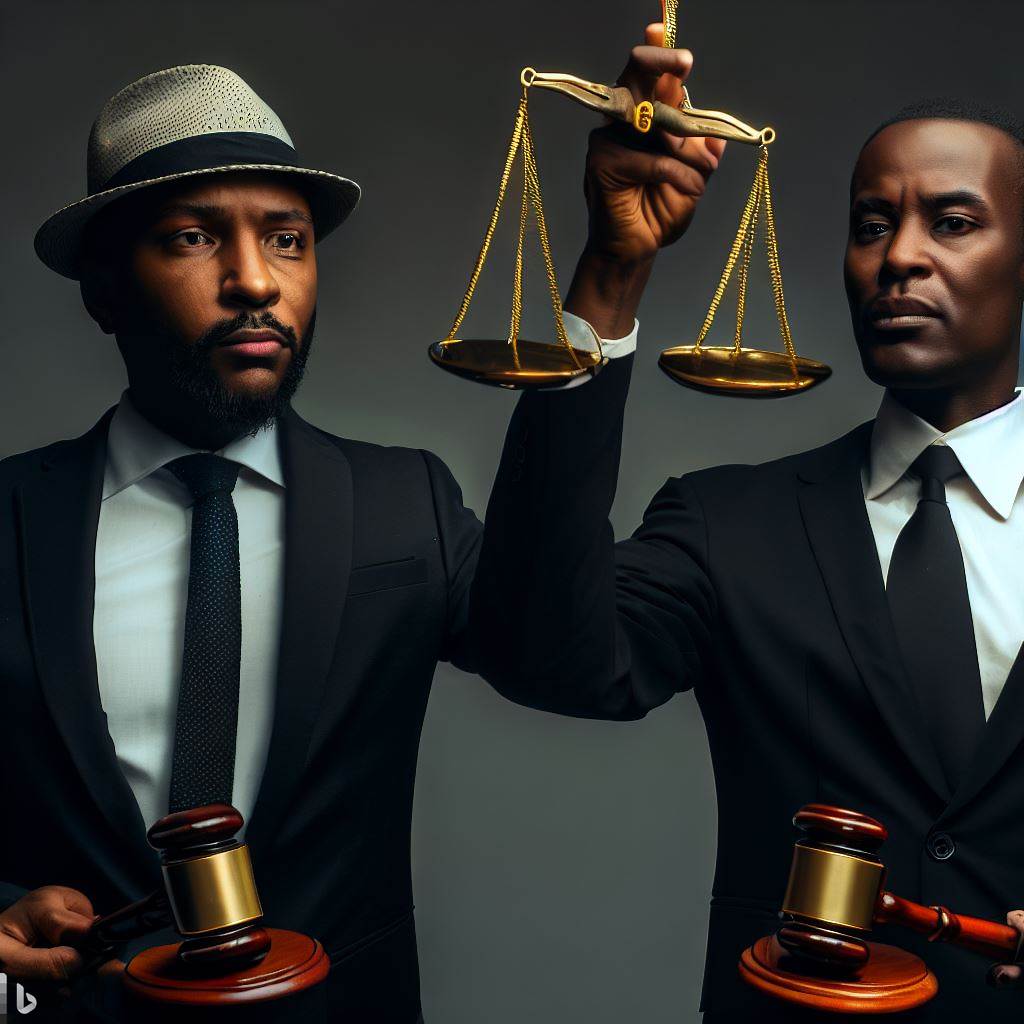Introduction
Entertainment law encompasses legal aspects related to the entertainment industry, including music, movies, television, and more.
It involves contractual agreements, copyright laws, intellectual property rights, licensing, and dispute resolution.
The Nigerian music industry has experienced significant growth and success in recent years.
It is known for its vibrant and diverse music genres, such as Afrobeat, Afropop, and Highlife.
Nigerian musicians, like Wizkid, Davido, and Burna Boy, have gained global recognition and won prestigious awards, increasing the industry’s prominence.
Entertainment lawyers act as legal representatives for artists, musicians, record labels, and other industry stakeholders.
They handle various legal matters, negotiate contracts, protect copyright, and ensure compliance with intellectual property laws.
These lawyers provide valuable guidance and support to artists in navigating the complexities of the music industry.
One crucial role of entertainment lawyers is contract negotiation.
They ensure that artists secure favorable terms and protect their rights in recording contracts, licensing agreements, and performance deals.
These lawyers also assist in resolving disputes between artists and record labels, helping to maintain healthy artist-label relationships.
Additionally, entertainment lawyers play a vital role in protecting artists’ intellectual property rights.
They help in registering copyrights for music compositions and sound recordings and take legal action against copyright infringement.
This ensures that artists receive proper recognition and monetary compensation for their creative works.
Basically, entertainment lawyers are essential in shaping the Nigerian music industry.
They provide legal expertise, protect artists’ rights, and foster a healthy and sustainable music ecosystem.
Their contributions contribute to the growth and success of Nigerian music on both local and global scales.
The Role of Entertainment Lawyers in Contract Negotiation
Importance of contracts in the music industry
- Contracts are essential in protecting the rights and interests of artists and music industry professionals.
- They ensure fair compensation, distribution of royalties, and intellectual property rights.
- Contracts also outline the responsibilities and obligations of all parties involved.
- Without contracts, disputes and conflicts may arise, leading to legal battles and financial losses.
Roles and responsibilities of entertainment lawyers in contract negotiation
- Entertainment lawyers serve as legal representatives for artists, songwriters, producers, and other industry professionals.
- They negotiate and draft contracts to ensure their clients’ best interests are protected.
- These lawyers possess a deep understanding of music industry practices and legal frameworks.
- They advise clients on various contract clauses, including exclusivity, territorial rights, and revenue sharing.
- Entertainment lawyers also help in resolving disputes and maintaining professional relationships.
Case studies/examples highlighting the impact of entertainment lawyers in contract negotiation
1. In the case of a popular Nigerian artist signing with a major record label
- Entertainment lawyers play a crucial role in negotiating favorable terms and ensuring transparency.
- They protect the artist’s creative control, royalty rates, and potential endorsements.
- Lawyers are also responsible for reviewing distribution deals and licensing agreements.
2. Contract negotiation between a songwriter and a music publisher
- Entertainment lawyers advocate for fair compensation for songwriters’ intellectual property.
- They secure favorable publishing deals and licensing arrangements for the songwriter’s compositions.
- Lawyers also help in negotiating rights for synchronization, performance, and mechanical royalties.
3. Independent artist contracting with a streaming platform
- Entertainment lawyers ensure the artist’s music is protected from unauthorized use.
- They negotiate licensing terms, revenue sharing, and rights management on behalf of the artist.
- Lawyers also advise artists on potential legal pitfalls and provide guidance on contract termination.
Generally, entertainment lawyers play a crucial role in shaping the Nigerian music industry through their involvement in contract negotiation.
Contracts are vital in safeguarding the rights and interests of artists, songwriters, and other industry professionals.
Entertainment lawyers provide legal expertise and guidance to ensure fair compensation, protection of intellectual property, and resolution of disputes.
Numerous case studies highlight the impact of these lawyers in securing favorable terms and promoting transparency in contractual relationships.
Without their valuable contributions, the music industry would face significant legal and financial risks.
Read: The Importance of Entertainment Lawyers in Nigeria’s Creative Sector
Protection of Intellectual Property Rights
Overview of intellectual property rights in the Nigerian music industry
- The Nigerian music industry is heavily reliant on the protection of intellectual property rights.
- Intellectual property rights refer to the legal rights granted to creators and owners of artistic and intellectual works.
- In the Nigerian music industry, intellectual property rights include copyrights, trademarks, and patents.
- Copyrights protect original musical compositions, sound recordings, and performances.
- Trademarks protect artist names, logos, and brand identities.
- Patents safeguard unique inventions or processes within the music industry.
- These rights allow creators and artists to control and monetize their work.
Role of entertainment lawyers in copyright registration and protection
- Entertainment lawyers play a crucial role in assisting artists with copyright registration and protection.
- They guide artists through the process of registering their music with the Nigerian Copyright Commission (NCC).
- Registration provides legal evidence of ownership and helps in resolving disputes over originality.
- Entertainment lawyers also ensure that artists understand their rights and the limitations of fair use.
- In cases of copyright infringement, entertainment lawyers take necessary legal actions to protect artists’ interests.
- They negotiate licensing and publishing agreements on behalf of artists to ensure proper compensation.
- Entertainment lawyers help in the enforcement of rights by monitoring and taking action against unauthorized use of copyrighted works.
Key legal strategies employed by entertainment lawyers to safeguard artists’ rights
- Drafting and negotiating contracts that clearly outline ownership rights, royalties, and usage terms.
- Ensuring that artists have proper clearance and licenses for samples or covers used in their music.
- Providing legal advice on issues related to plagiarism, defamation, and privacy rights.
- Monitoring and issuing cease and desist letters to individuals or companies infringing upon artists’ rights.
- Taking legal action, if necessary, to seek damages and injunctions against infringers.
- Collaborating with organizations like Performing Musicians Association of Nigeria (PMAN) to advocate for stronger intellectual property rights protection.
- Educating artists about the importance of protecting their intellectual property and the potential risks involved.
In essence, entertainment lawyers play a pivotal role in shaping the Nigerian music industry by protecting the intellectual property rights of artists.
Through their expertise in copyright registration and protection, as well as their employment of key legal strategies, artists are able to safeguard their creative works and receive fair compensation for their contributions to the industry.
Read: From Law School to Showbiz: A Journey into Entertainment Law
Compliance with Regulatory Frameworks
Explanation of the regulatory frameworks applicable to the Nigerian music industry
- Copyright Act: The Nigerian music industry operates under the Copyright Act, which protects the rights of music creators and performers.
- Nigerian Copyright Commission (NCC): This regulatory body oversees the implementation and enforcement of copyright laws.
- Nigerian Broadcasting Commission (NBC): The NBC regulates the broadcasting and distribution of music in Nigeria, ensuring compliance with content and licensing requirements.
- Performing Musicians Employers’ Association of Nigeria (PMAN): PMAN acts as a collective management organization, protecting the rights of musicians and ensuring fair compensation.
How entertainment lawyers ensure compliance with licensing and copyright laws
- Licensing Compliance: Entertainment lawyers assist artists in obtaining the necessary licenses for their music, such as mechanical licenses for reproducing songs or synchronization licenses for using music in films.
- Copyright Registration: Lawyers help artists register their musical works with the NCC to establish legal ownership and copyright protection.
- Contract Drafting and Review: Lawyers play a crucial role in negotiating and drafting contracts between artists, record labels, and distributors, ensuring compliance with copyright and licensing agreements.
- Intellectual Property Protection: Entertainment lawyers help artists protect their intellectual property rights, including trademarks, copyrights, and patents, by filing necessary applications and enforcing these rights when infringements occur.
- Royalty Collection: Lawyers work with collection societies and agencies to ensure that artists receive fair compensation for their music, overseeing the collection, distribution, and enforcement of royalties.
Case studies illustrating the role of entertainment lawyers in helping artists navigate regulatory challenges
- Artist A’s Copyright Infringement: When Artist A discovered that another artist had sampled their song without permission, their entertainment lawyer initiated legal proceedings, resulting in a settlement and compensation for Artist A.
- Artist B’s Licensing Dispute: Artist B’s music was used in a popular TV series without proper licensing. Their lawyer negotiated a favorable settlement, securing compensation and future licensing rights.
- Artist C’s Contract Dispute: Artist C signed a record deal with unfavorable terms. Their entertainment lawyer reviewed the contract, identified loopholes, and negotiated for more favorable conditions, protecting Artist C’s interests.
- Artist D’s Royalty Collection: Artist D hired an entertainment lawyer to pursue unpaid royalties from digital streaming platforms. The lawyer successfully negotiated with the platforms, resulting in the release of outstanding payments to Artist D.
In a nutshell, compliance with regulatory frameworks in the Nigerian music industry is vital for the protection of artists’ rights and the growth of the industry.
Entertainment lawyers play a crucial role in ensuring compliance with licensing and copyright laws, as well as helping artists navigate regulatory challenges.
Through their expertise, artists can protect their intellectual property, secure fair compensation, and avoid legal disputes.
Read: Contribution of Nigerian Attorneys in International Law

Dispute Resolution and Litigation
Overview of Common Disputes in the Nigerian Music Industry
Here are some common disputes that arise in the Nigerian music industry:
- Contractual disputes: Artists may find themselves in disagreements with record labels or managers over contract terms and conditions.
- Copyright infringement: Cases where artists or producers allege that their work has been used without proper authorization.
- Royalty disputes: Disagreements over the payment of royalties from music sales, streaming platforms, or performances.
- Intellectual property disputes: Issues regarding trademark infringement, name or image rights, and unauthorized use of music.
- Publishing disputes: Disputes over the ownership, administration, or distribution of musical compositions.
Importance of Entertainment Lawyers in Resolving Conflicts through Negotiation and Mediation
Entertainment lawyers play a crucial role in resolving disputes through negotiation and mediation due to the following reasons:
- Expertise in entertainment law: These lawyers have a deep understanding of the industry’s legal intricacies, allowing them to navigate complex disputes effectively.
- Legal representation and advice: They provide artists with sound legal guidance, ensuring their rights are protected during negotiations or mediation processes.
- Mediation facilitation: Entertainment lawyers act as mediators, helping conflicting parties find common ground and reach mutually beneficial agreements.
- Contractual expertise: Their knowledge of contract law allows them to analyze and interpret agreements, ensuring fair resolutions.
- Preserving relationships: Lawyers can help preserve relationships between artists, record labels, and other industry stakeholders by facilitating communication and finding compromises.
Legal Representation and Litigation Support Provided by Entertainment Lawyers in Court Cases
When disputes escalate, entertainment lawyers offer legal representation and litigation support in court cases, providing the following services:
- Case evaluation: Lawyers assess the merits of a case, gathering evidence, and analyzing legal options available to their clients.
- Court representation: They represent their clients in court, presenting arguments, examining witnesses, and cross-examining opposing parties.
- Legal strategy development: Lawyers develop legal strategies tailored to each case, maximizing chances of a favorable outcome for their clients.
- Evidence gathering and documentation: They collect evidence, interview witnesses, and prepare necessary legal documents for court proceedings.
- Negotiation and settlement: Lawyers engage in negotiations with opposing parties, seeking fair settlements before or during court proceedings.
- Appeal representation: In case of an unfavorable judgment, entertainment lawyers can also represent clients in the appeals process.
Essentially, dispute resolution and litigation in the Nigerian music industry are complex matters.
Entertainment lawyers play an essential role in resolving disputes through negotiation, mediation, and, if necessary, providing legal representation in court.
Their expertise helps artists protect their rights and achieve favorable outcomes in various conflicts that may arise.
Read: Entertainment Law and IP Rights: What Every Nigerian Artist Should Know
Emerging Trends and Future Outlook
Discussion on the evolving nature of the Nigerian music industry
The Nigerian music industry has experienced significant growth and transformation over the years.
From traditional music to contemporary genres such as Afrobeats and Afro-pop, the industry has evolved to cater to diverse musical tastes and preferences.
This evolution has been driven by various factors, including globalization, technological advancements, and changing consumer behavior.
One of the key trends in the industry is the increasing focus on collaborations and partnerships.
Nigerian artists are now collaborating with international acts, expanding their reach and global appeal.
This trend has not only elevated the profile of Nigerian music but has also opened up new opportunities for entertainment lawyers.
These lawyers play a vital role in negotiating contracts, ensuring that artists’ rights are protected, and helping them maximize their earnings from collaborations.
Furthermore, the rise of digital platforms and streaming services has revolutionized the way music is consumed.
With the advent of platforms like Spotify, Apple Music, and YouTube, artists can reach a global audience without the need for traditional record labels.
This shift has given artists greater control over their careers and income streams.
Entertainment lawyers have had to adapt to these changes, familiarizing themselves with legal issues related to intellectual property rights, licensing, and digital distribution.
Influence of technology and digital platforms on entertainment law
Technology and digital platforms have had a profound impact on entertainment law in Nigeria.
These advancements have both created challenges and opportunities for entertainment lawyers.
On one hand, the ease of digital sharing has made it more difficult to combat piracy and copyright infringement.
Entertainment lawyers now have to navigate the complex world of online piracy and develop strategies to protect their clients’ work.
On the other hand, digital platforms have provided Nigerian artists with a global stage to showcase their talent.
Platforms like SoundCloud and YouTube have allowed artists to gain exposure and build a fan base without the need for traditional gatekeepers.
Entertainment lawyers can assist artists in leveraging these platforms effectively, ensuring that their rights are protected, and they are fairly compensated for their work.
Speculations about future challenges and opportunities for entertainment lawyers in shaping the industry
As the Nigerian music industry continues to evolve, entertainment lawyers face both challenges and opportunities.
One of the key challenges is the need to stay abreast of rapidly changing technology and digital platforms.
It is essential for lawyers to understand emerging trends and how they impact the rights and interests of their clients.
Another challenge is the increasing complexity of music contracts.
With the rise of collaborations and international ventures, entertainment lawyers must navigate complex agreements that involve multiple parties and jurisdictions.
This requires a deep understanding of intellectual property law, contract law, and international regulations.
Despite these challenges, there are also significant opportunities for entertainment lawyers to shape the industry.
The Nigerian music market is growing rapidly, creating a greater demand for legal services.
Entertainment lawyers can play a pivotal role in ensuring that artists’ rights are protected, contracts are fair, and revenues are maximized.
Additionally, with the international recognition of Nigerian music, there is an opportunity for entertainment lawyers to help Nigerian artists expand their global reach and negotiate lucrative international deals.
All in all, the evolving nature of the Nigerian music industry, along with advancements in technology and digital platforms, presents both challenges and opportunities for entertainment lawyers.
By staying ahead of industry trends, understanding the legal implications of technology, and advocating for the rights of their clients, entertainment lawyers can continue to shape the Nigerian music industry and support the growth of Nigerian artists on the global stage.
Read: The Evolution and History of Legal Professions in Nigeria
Conclusion
Recap of the crucial role played by entertainment lawyers in the Nigerian music industry
Entertainment lawyers have a vital role in shaping the Nigerian music industry.
They provide legal guidance, protect artists’ rights, negotiate contracts, and ensure fair compensation.
Without them, the industry would face numerous legal challenges and exploitation.
Final thoughts on the topic and its significance for the industry’s growth and development
Entertainment lawyers not only protect the interests of artists but also contribute to the growth and development of the Nigerian music industry.
Their expertise ensures a fair and thriving environment for all stakeholders, fostering creativity, investment, and innovation in the industry.
It is crucial to acknowledge and support the crucial role played by entertainment lawyers for the industry’s continued progress.




